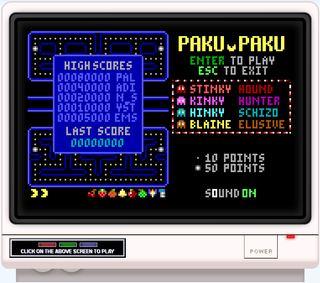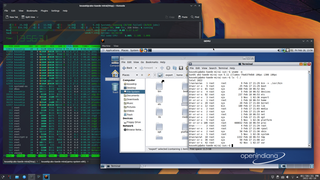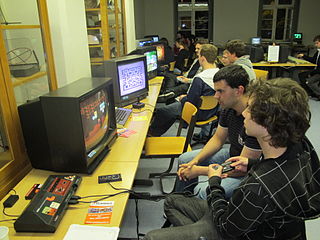
UAE is a computer emulator which emulates the hardware of Commodore International's Amiga range of computers. Released under the GNU General Public License, UAE is free software.

MAME is a free and open-source emulator designed to recreate the hardware of arcade game systems in software on modern personal computers and other platforms. Its intention is to preserve gaming history by preventing vintage games from being lost or forgotten. It does this by emulating the inner workings of the emulated arcade machines; the ability to actually play the games is considered "a nice side effect". Joystiq has listed MAME as an application that every Windows and Mac gamer should have.
In computer science, dynamic recompilation is a feature of some emulators and virtual machines, where the system may recompile some part of a program during execution. By compiling during execution, the system can tailor the generated code to reflect the program's run-time environment, and potentially produce more efficient code by exploiting information that is not available to a traditional static compiler.
The Mac 68k emulator is a software emulator built into all versions of the classic Mac OS for PowerPC. This emulator enabled running applications and system code that were originally written for the 680x0-based Macintosh models. With a few exceptions, notably Connectix's RAM Doubler, the emulator ran all software with no noticeable impact other than lower performance relative to the same program when compiled for PowerPC.

Bleem! is a commercial PlayStation emulator released by the Bleem! Company in 1999 for IBM-compatible PCs and Dreamcast. It is notable for being one of the few commercial software emulators to be aggressively marketed during the emulated console's lifetime, and was the center of multiple controversial lawsuits.
Virtual PC is an x86 emulator for PowerPC Mac hosts and a virtualization app for Microsoft Windows hosts. It was created by Connectix in 1997 and acquired by Microsoft in 2003. The Mac version was discontinued in 2006 following the Mac transition to Intel, while the Windows version was discontinued in 2011 in favour of Hyper-V.

Connectix Corporation was a software and hardware company, noted for having released innovative products that were either made obsolete as Apple Computer incorporated the ideas into system software, or were sold to other companies once they became popular. It was formed in October 1988 by Jon Garber; dominant board members and co-founders were Garber, Bonnie Fought, and close friend Roy McDonald. McDonald was still Chief Executive Officer and president when Connectix finally closed in August 2003.

A personal computer game, also known as a computer game or abbreviated PC game, is a video game played on a personal computer (PC). They are defined by the open platform nature of PC systems.

QEMU is a free and open-source emulator. It emulates a computer's processor through dynamic binary translation and provides a set of different hardware and device models for the machine, enabling it to run a variety of guest operating systems. It can interoperate with Kernel-based Virtual Machine (KVM) to run virtual machines at near-native speed. QEMU can also do emulation for user-level processes, allowing applications compiled for one architecture to run on another.

A Macintosh clone is a computer running the Mac OS operating system that was not produced by Apple Inc. The earliest Mac clones were based on emulators and reverse-engineered Macintosh ROMs. During Apple's short lived Mac OS 7 licensing program, authorized Mac clone makers were able to either purchase 100% compatible motherboards or build their own hardware using licensed Mac reference designs.

Retrogaming, also known as classic gaming and old school gaming, is the playing and collection of obsolete personal computers, consoles, and video games. Usually, retrogaming is based upon systems that are outmoded or discontinued, although ported retrogaming allows games to be played on modern hardware via ports or compilations. It is typically for nostalgia, preservation, or authenticity. A new game could be retro styled, such as an RPG with turn-based combat and pixel art in isometric camera perspective.

Intellivision Lives! is a compilation of over 60 Intellivision video games, originally produced by Mattel Electronics and INTV Corporation between 1978 and 1990. Using original game code and software emulation, Intellivision Productions released the compilation on a Windows and Macintosh hybrid CD-ROM in December 1998. Additional versions were then released for the PlayStation 2, Xbox, and GameCube by Crave Entertainment. In 2010, Virtual Play Games released a Nintendo DS version.

PCSX2 is a free and open-source PlayStation 2 emulator for Windows, Linux, and macOS that supports a wide range of PlayStation 2 video games with a high level of compatibility and functionality. Although PCSX2 can closely mirror the original gameplay experience on the PlayStation 2, PCSX2 supports a number of improvements over gameplay on a traditional PlayStation 2, such as the ability to use resolutions up to 8 times larger than native, anti-aliasing and texture filtering.
The Amiga computer can be used to emulate several other computer platforms, including legacy platforms such as the Commodore 64, and its contemporary rivals such as the IBM PC and the Macintosh.
Mac gaming refers to the use of video games on Macintosh personal computers. In the 1990s, Apple computers did not attract the same level of video game development as Microsoft Windows computers due to the high popularity of Microsoft Windows and, for 3D gaming, Microsoft's DirectX technology. In recent years, the introduction of Mac OS X and support for Intel processors has eased porting of many games, including 3D games through use of OpenGL and more recently Apple's own Metal API. Virtualization technology and Boot Camp also permit the use of Windows and its games on Macintosh computers. Today, a growing number of popular games run natively on macOS, though as of early 2019, a majority still require the use of Microsoft Windows.

The PlayStation 2 (PS2) is a home video game console developed and marketed by Sony Interactive Entertainment. It was first released in Japan on 4 March 2000, in North America on 26 October 2000, in Europe on 24 November 2000, and in Australia on 30 November 2000. It is the successor to the original PlayStation, as well as the second installment in the PlayStation brand of consoles. As a sixth-generation console, it competed with Nintendo's GameCube, Sega's Dreamcast, and Microsoft's Xbox. It is the best-selling video game console of all time, having sold over 155 million units worldwide, nearly triple the combined sales of the Dreamcast, GameCube, and Xbox.

A video game console emulator is a type of emulator that allows a computing device to emulate a video game console's hardware and play its games on the emulating platform. More often than not, emulators carry additional features that surpass limitations of the original hardware, such as broader controller compatibility, timescale control, easier access to memory modifications, and unlocking of gameplay features. Emulators are also a useful tool in the development process of homebrew demos and the creation of new games for older, discontinued, or rare consoles.

In computing, an emulator is hardware or software that enables one computer system to behave like another computer system. An emulator typically enables the host system to run software or use peripheral devices designed for the guest system. Emulation refers to the ability of a computer program in an electronic device to emulate another program or device.

Sony Computer Entertainment v. Connectix Corporation, 203 F.3d 596 (2000), is a decision by the Ninth Circuit Court of Appeals which ruled that the copying of a copyrighted BIOS software during the development of an emulator software does not constitute copyright infringement, but is covered by fair use. The court also ruled that Sony's PlayStation trademark had not been tarnished by Connectix Corp.'s sale of its emulator software, the Virtual Game Station.

Mac OS is the series of operating systems developed for the Macintosh family of personal computers by Apple Computer, Inc. from 1984 to 2001, starting with System 1 and ending with Mac OS 9. The Macintosh operating system is credited with having popularized the graphical user interface concept. It was included with every Macintosh that was sold during the era in which it was developed, and many updates to the system software were done in conjunction with the introduction of new Macintosh systems.















